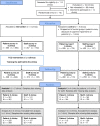A cluster-randomized controlled study to evaluate a team coaching concept for improving teamwork and patient-centeredness in rehabilitation teams
- PMID: 28704377
- PMCID: PMC5509115
- DOI: 10.1371/journal.pone.0180171
A cluster-randomized controlled study to evaluate a team coaching concept for improving teamwork and patient-centeredness in rehabilitation teams
Erratum in
-
Correction: A cluster-randomized controlled study to evaluate a team coaching concept for improving teamwork and patient-centeredness in rehabilitation teams.PLoS One. 2017 Dec 21;12(12):e0190338. doi: 10.1371/journal.pone.0190338. eCollection 2017. PLoS One. 2017. PMID: 29267393 Free PMC article.
Abstract
Purpose: Although the relevance of interprofessional teamwork in the delivery of patient-centered care is well known, there is a lack of interventions for improving team interaction in the context of rehabilitation in Germany. The aim of the present study is to evaluate whether a specially developed team coaching concept (TCC) could improve both teamwork and patient-centeredness.
Method: A multicenter, cluster-randomized controlled intervention study was conducted with both staff and patient questionnaires. Data was collected at ten German rehabilitation clinics (five clusters) of different indication fields before (t1) and after (t2) the intervention. Intervention clinics received the TCC, while control clinics did not receive any treatment. Staff questionnaires were used to measure internal participation and other aspects of teamwork, such as team organization, while patient questionnaires assessed patient-centeredness. A multivariate analysis of variance was applied for data analysis.
Results: In order to analyze the effect of TCC on internal participation and teamwork, 305 questionnaires were included for t1 and 213 for t2 in the staff survey. In the patient survey, 523 questionnaires were included for t1 and 545 for t2. The TCC improved team organization, willingness to accept responsibility and knowledge integration according to staff, with small effect sizes (univariate: η2=.010-.017), whereas other parameters including internal participation, team leadership and cohesion did not improve due to the intervention. The patient survey did not show any improvements on the assessed dimensions.
Conclusion: The TCC improved dimensions that were addressed directly by the approach and were linked to the clinics' needs, such as restructured team meetings and better exchange of information. The TCC can be used to improve team organization, willingness to accept responsibility, and knowledge integration in rehabilitation practice, but some further evaluation is needed to understand contextual factors and processes regarding the implementation of the intervention.
Conflict of interest statement
Figures
Similar articles
-
A patient-centred team-coaching concept for medical rehabilitation.J Interprof Care. 2018 Jan;32(1):123-126. doi: 10.1080/13561820.2017.1357542. Epub 2017 Oct 3. J Interprof Care. 2018. PMID: 28972419 Clinical Trial.
-
[Team Development in Medical Rehabilitation: Concept and Evaluation of a Team Intervention].Rehabilitation (Stuttg). 2016 Apr;55(2):74-80. doi: 10.1055/s-0042-100584. Epub 2016 Apr 12. Rehabilitation (Stuttg). 2016. PMID: 27070980 Clinical Trial. German.
-
Interprofessional teamwork in medical rehabilitation: a comparison of multidisciplinary and interdisciplinary team approach.Clin Rehabil. 2010 Aug;24(8):745-55. doi: 10.1177/0269215510367538. Epub 2010 Jun 8. Clin Rehabil. 2010. PMID: 20530646
-
Teams, tribes and patient safety: overcoming barriers to effective teamwork in healthcare.Postgrad Med J. 2014 Mar;90(1061):149-54. doi: 10.1136/postgradmedj-2012-131168. Epub 2014 Jan 7. Postgrad Med J. 2014. PMID: 24398594 Review.
-
Illusions of team working in health care.J Health Organ Manag. 2013;27(1):134-42. doi: 10.1108/14777261311311843. J Health Organ Manag. 2013. PMID: 23734481 Review.
Cited by
-
Development and pilot testing of an interprofessional patient-centered team training programme in medical rehabilitation clinics in Germany: a process evaluation.BMC Med Educ. 2017 Jul 14;17(1):120. doi: 10.1186/s12909-017-0960-x. BMC Med Educ. 2017. PMID: 28705207 Free PMC article.
-
Characteristics of Multiprofessional and Client-Oriented Approach in Occupational Health Services: A Cross-Sectional Survey Among Occupational Health Professionals.J Multidiscip Healthc. 2024 May 10;17:2121-2132. doi: 10.2147/JMDH.S454138. eCollection 2024. J Multidiscip Healthc. 2024. PMID: 38736538 Free PMC article.
-
Effects of interprofessional education on teamwork and on knowledge chronic conditions management.Rev Lat Am Enfermagem. 2019 Oct 28;27:e3203. doi: 10.1590/1518-8345.3095.3203. eCollection 2019. Rev Lat Am Enfermagem. 2019. PMID: 31664411 Free PMC article.
-
Interventions to improve team effectiveness within health care: a systematic review of the past decade.Hum Resour Health. 2020 Jan 8;18(1):2. doi: 10.1186/s12960-019-0411-3. Hum Resour Health. 2020. PMID: 31915007 Free PMC article.
-
Self-help friendliness and cooperation with self-help groups among rehabilitation clinics in Germany (KoReS): a mixed-methods study protocol.BMJ Open. 2024 Mar 20;14(3):e083489. doi: 10.1136/bmjopen-2023-083489. BMJ Open. 2024. PMID: 38508651 Free PMC article.
References
-
- Reeves S, Zwarenstein M, Goldman J, Barr H, Freeth D, Koppel I et al. The effectiveness of interprofessional education: Key findings from a new systematic review. Journal of Interprofessional Care 2010; 24(3):230–41. doi: 10.3109/13561820903163405 - DOI - PubMed
-
- Antoni CH. Interprofessionelle Teamarbeit im Gesundheitsbereich: Teamorientierte Zusammenarbeit. Zeitschrift für Evidenz, Fortbildung und Qualität im Gesundheitswesen 2010. [cited 05.2012]; 104(1):18–24. - PubMed
-
- Loh A, Simon D, Wills CE, Kriston L, Niebling W, Härter M. The effects of a shared decision-making intervention in primary care of depression: a cluster-randomized controlled trial. Patient Education and Counseling 2007; 67(3):324–32. doi: 10.1016/j.pec.2007.03.023 - DOI - PubMed
-
- Körner M, Bütof S, Müller C, Zimmermann L, Becker S, Bengel J. Interprofessional Teamwork and Team Interventions in Chronic Care: A Systematic Review. Journal of Interprofessional Care 2016; 30(1):15–28. doi: 10.3109/13561820.2015.1051616 - DOI - PubMed
-
- Mickan SM, Rodger SA. Effective Health Care Teams: A model of six characteristics developed from shared perceptions. Journal of Interprofessional Care 2005; 19(4):358–70. doi: 10.1080/13561820500165142 - DOI - PubMed
Publication types
MeSH terms
LinkOut - more resources
Full Text Sources
Other Literature Sources
Medical



